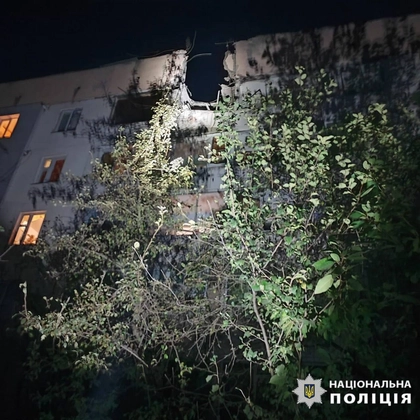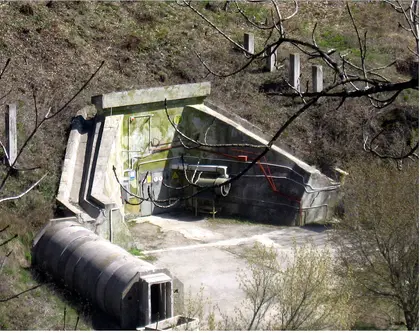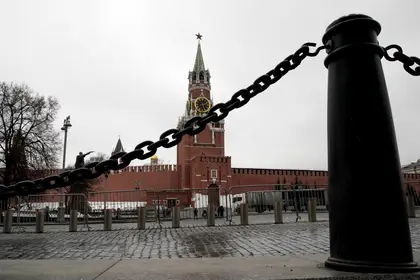Control of Ukraine’s Crimean peninsula as a potential nuclear weapons platform is, according to the Kremlin, a critical component of Russian national security strategy, which aims to use the threat of mutually-assured destruction to keep the peace with the West, by deploying nuclear-armed bombers and submarines on NATO’s eastern doorstep.
But now, advancing Ukrainian troops armed with precision-guided weapons, may soon be poised to strike Russian strategic air bases, submarine pens, and an atomic weapon storage site in the Black Sea peninsula - leaving Russian leader Vladimir Putin with the unpleasant choice of nuclear escalation against NATO or backing down on Crimea, Ukrainian officials and security analysts said.
Andriy Chernyak, a spokesman for the Armed Forces of Ukraine (AFU)’s Main Intelligence Directorate, said in Jan. 3 comments to the Ukrinform news agency that Russian "ground-based, air-based and sea-based nuclear munition carriers are currently stationed in temporarily-occupied Crimea."
Ukrainian military intelligence has, moreover, observed "certain work" being carried out at the top secret Feodosiya-13 nuclear weapons storage site, a Soviet-era network of reinforced concrete bunkers dug into the side of a pine-topped mountain overlooking the Black Sea resort towns of Koktebel and Sudak, he said.
In 2001 Ukraine completed a hand over to Russia of all nuclear warheads held at Feodosiya-13 and elsewhere in the country, and the transfer or destruction of all its nuclear weapons delivery systems.

Kyiv Hit by Massive Drone Attack as Russian Strikes Target Multiple Ukrainian Cities
In exchange, Ukraine received Kremlin guarantees to respect Ukraine’s borders and not to threaten Ukrainian national sovereignty. The spike in engineering work at Feodosiya-13 means Russia is intent on, and possibly has already begun the return of nuclear weapons to Crimea, with World War Three implications, Chernyak said.
"They (Russia) are capable of anything," he noted. "(W)e hope that the international community will be able to influence the leadership of the occupying country (Russia) so as not to lead the world to a nuclear catastrophe."
Vladislav Seleznev, a Crimea native and Ukrainian military analyst, told Kyiv Post that the Russian Federation (RF) wants to keep nuclear weapons delivery systems in Crimea if possible, but, advancing Ukrainian troops equipped with long-range strike weapons have already forced the Kremlin to evacuate some mobile nuclear weapons delivery systems – particularly missile-carrying submarines and heavy bombers – back to Russia.
Were the AFU to reach the northern shore of the Black Sea other pieces of Russia’s nuclear deterrent capacity, among them the bunker entrances at Feodosiya-13 and missile-carrying Russian surface warships tied up at Sevastopol harbor, headquarters of Russia’s Black Sea Fleet, would come well within the range of Ukrainian precision-guided rockets, anti-ship missiles and suicide drones, Seleznev said.
"The Ukrainians have a record of trying to hit whatever (Russian target) they can reach, as soon as they can," Seleznev said. "(T)he main question for them (Ukrainian military decision-makers) is how that strike might advance their strategy of forcing Russia to leave Ukraine."
Oleksiy Yizhak, from the National Institute for Strategic Studies (NISS) in Jan. 4 comments to Radio NV said that answering that question is complicated by the reality that most Russian long-range weapons in Crimea – including cruise missiles, strike jets and heavy artillery rockets – are designed to carry both nuclear and conventional warheads.
Almost any Ukrainian attack on any major Russian weapons system in Crimea, he said, the Kremlin might choose to interpret as a direct threat to Russia’s strategic nuclear forces and Russian national security.
"Everything that is located in Crimea is dual-capable carriers," Yizhak said. "They are used in conventional warfare. And everything used by Russia in conventional warfare is a legitimate target for attack."
Russian President Vladimir Putin said on Sep. 21, according to news wire reports, that he was not bluffing when he said he'd be ready to use nuclear weapons to defend Russia.
Mattias Eken, a researcher at the Defence and Security Research Group for RAND Europe, said the Kremlin will most likely avoid risking nuclear weapons delivery systems in Crimea, and that when it comes to nuclear deterrence, for Moscow, the peninsula is an important but not irreplaceable piece of the Russian nuclear triad.
"Russia will not want to risk losing what remaining advanced platforms it has. As such I think it will operate somewhat more cautiously in Crimea, at least as far as the deployment of advanced weapon platforms is concerned," Eken said. "Russia possesses enough airplanes, nuclear armed submarines, and intercontinental- ballistic missiles based elsewhere that its nuclear triad is not threatened by Ukrainian strikes."
The engineering works at Feodosiya-13 are taking place, but it is not clear whether the construction is linked to nuclear weapons or their storage, and "(n)or have there been any credible reports of non-strategic nuclear warheads being removed from central storage and stationed in Crimea, or elsewhere, as this would likely have been picked up by Ukrainian and U.S. intelligence," Eken said.
"Should Ukrainian attacks on Crimea escalate, or if Russia was at risk of losing control of the peninsula, it could lead to an increased danger of Russia resorting to threats of nuclear escalation. Actual use of nuclear weapons, even at a tactical and limited scale, remains unlikely as it would incur enormous risks for Russia," Eken said.
Seleznev agreed Crimea is an unlikely pretext for a Russian move up the nuclear escalation ladder, and that warnings issued by the U.S. and NATO of catastrophic consequences were the Kremlin to actually detonate a nuclear device in Ukraine are very likely to prevent Kremlin nuclear threats over Crimea from becoming reality.
"But there really is no telling what Putin might do if Ukraine attacked those sites, " Seleznev said. "The same goes for the West. They want to help Ukraine, but they don’t have a strategy."
You can also highlight the text and press Ctrl + Enter






